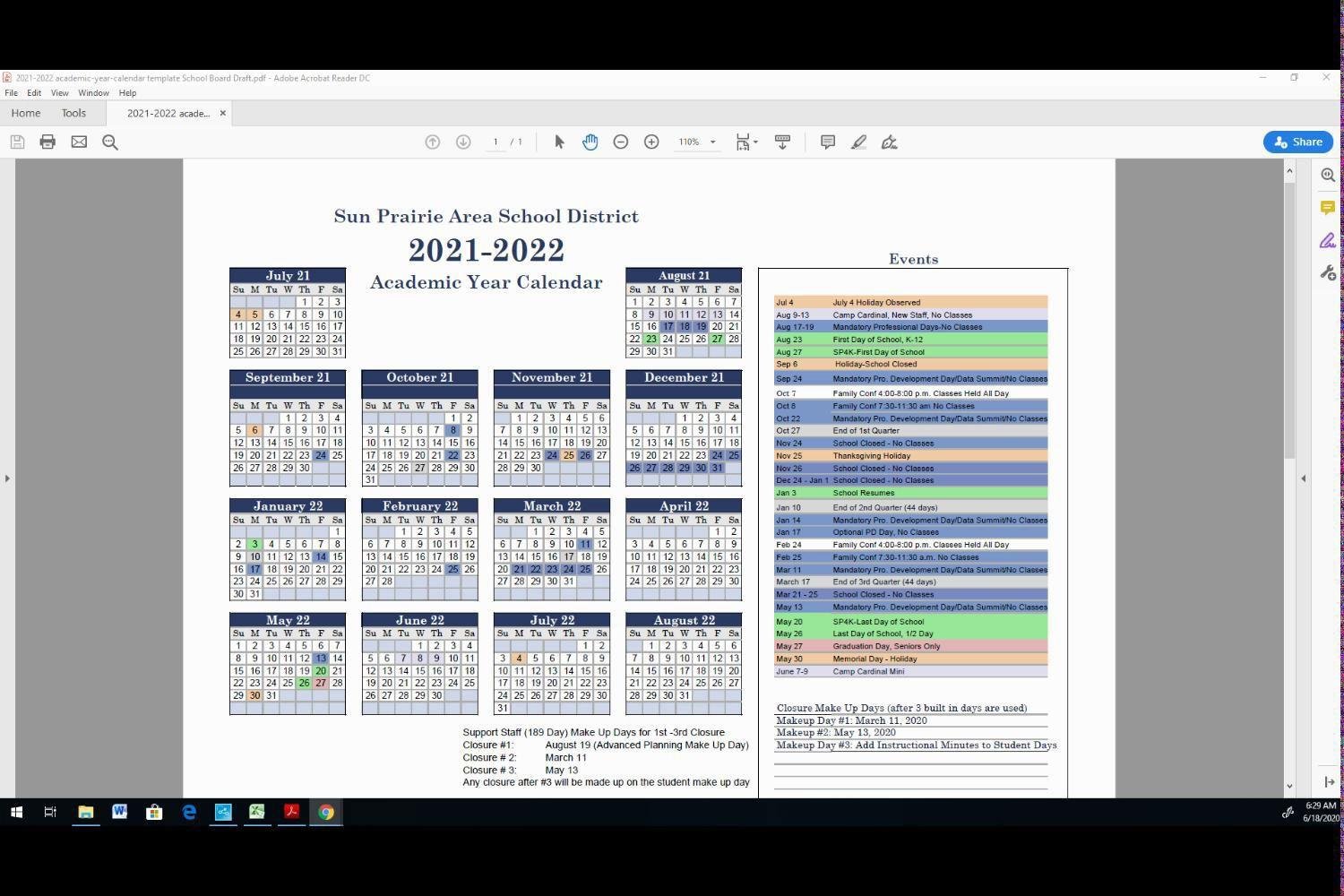Wisconsin Madison Academic Calendar – Master’s degree students who have been absent for five or more consecutive years lose all credits they have earned before the absence. Individual programs may count student work completed prior to their absence toward program requirements;
such coursework may not count toward Graduate School credit requirements. The establishment of the University of Wisconsin–Madison academic calendar is within the faculty’s authority as set forth in faculty policies and procedures. The construction of the academic calendar is based on various rules and guidelines established by the Board of Regents, the Faculty Senate and Wisconsin State law.
Wisconsin Madison Academic Calendar
 Source: whnt.com
Source: whnt.com
The faculty senate approves the academic calendar covering the next five years. The list does not include all possible religious and cultural ceremonies that may be requested by students, but should be used as a guide to understand the potential conflicts of large religious ceremonies that may be observed by the number of students in your class.
Time Constraints
The Graduate School requires students to maintain a grade point average (GPA) of 3.00 (on a 4.00 scale) for all graduate courses (except research) to receive a degree. Many programs make high demands. Students should check their program.
Incomplete grades are considered unsatisfactory if they are not dropped during the following semester. The McBurney Disability Resource Center is an office within the Division of Student Affairs that sees disability as an important aspect of UW-Madison’s diversity.
We are committed to creating an accessible and inclusive educational experience for students. We do this by partnering with students, faculty, and staff to create accessible environments and provide academic accommodations so students can engage, explore, and participate in the Wisconsin Idea.
More information about the college’s resources for professional development for students is available in Professional development for graduate students. Students can stay up-to-date by reading GradConnections, the weekly graduate student newsletter, bookmarking the events calendar to track upcoming workshops that interest them, and following the Graduate School’s Twitter, Facebook, YouTube, or Instagram accounts.
Academic Calendar
The Graduate School requires students to maintain a grade point average (GPA) of 3.00 (on a 4.00 scale) for all graduate courses (except research) to receive a degree. Many programs make high demands. Students should check their program.
Incomplete grades are considered unsatisfactory if they are not dropped during the following semester. The UW–Madison Graduate School offers a Master of Arts, Master of Science, Master of Accounting, Master of Business Administration, Master of Music, Master of Engineering, Master of French Studies, Master of International Public Affairs, Master of Music, Master of Music
of Public Affairs, Master of Social Work, Master of Fine Arts, Educational Specialist, Voice Doctor, Doctor of Musical Arts, Doctor of Nursing Practice, Doctor of Occupational Therapy, and Doctor of Philosophy. In addition, several programs that do not award graduate degrees may offer a doctoral degree, a diploma, a graduate/professional certificate, or a capstone certificate.
Some major programs have specified subtopics, known as “stated options”. These officially stated options have been approved by the university administration and appear on the transcript when the degree is awarded. Some programs also have unofficial specializations that do not appear on the transcript.
Other Grade Requirements
Breadth is a necessary part of graduate education at UW–Madison. A student’s doctoral program major determines how the breadth is achieved: Students may complete an additional doctoral or graduate/professional certificate program, or the breadth is built into the doctoral program’s core curriculum.
Most major programs require students to use a doctoral or graduate/professional certificate to meet the breadth requirement. If a minor is not required in the student’s major doctoral program, this is noted on the Degree Requirements tab of the guidance or the Named Options page.
 Source: bloximages.newyork1.vip.townnews.com
Source: bloximages.newyork1.vip.townnews.com
See Academic Policies and Procedures for Minors in the Graduate School for minimum course requirements for a minor. For well-prepared upper secondary students, the student’s program may choose to accept a previous course from another institution.
This course does not appear on the UW-Madison transcript nor does it count toward the graduate GPA. The Graduate School’s minimum residency requirement can only be satisfied by courses taken as a graduate student at UW-Madison.
Disability Resources
The exception is a higher level course taken as a CIC Travel Scholar. The Graduate School periodically reviews the record of any student who has earned a grade of BC, C, D, F, or Incomplete in a major (300 or higher), or a grade of U in credits.
This review may result in academic probation and suspension from future admission or suspension from the Graduate School. UW-Madison will find your fit. Our college offers 600 bachelor’s and graduate programs and more than 9,000 courses – from accounting to animal science and everything in between.
Whether you’re deciding or still discovering, we help you match your dream to your level. The UW Academic Calendar, which provides information several years into the future, is useful for finding dates for the first day of classes (winter semester only) and holidays, but does NOT provide accurate information about Law School Orientation, the day at the end of law classes.
, periods of law exams, grade reports or the first day of the spring term for law classes. The university offers several certificate and capstone programs that are available in whole or in part remotely or that are flexible with work schedules and evening and/or weekend courses.
Other Grade Requirements
To learn more about graduate degrees and certificates offered in flexible, online formats, visit the Wisconsin Professional Degrees & Certificates website. Master’s degree students who have been absent for five or more consecutive years lose all credits they have earned before the absence.
Individual programs may count student work completed prior to their absence toward program requirements; such coursework may not count toward Graduate School credit requirements. For well-prepared advanced students, the student’s program may decide to accept up to 7 credits counted toward 300 or more of required or elective courses from undergraduate work completed at UW-Madison in return for meeting the minimum degree and minor loan requirements.
However, this work will not be allowed to count towards the minimum 50% of the master’s thesis unless it is done at 700 level or higher. This work will not appear on the graduate career section of the UW-Madison transcript nor count toward the graduate GPA.
Registration with the Minnesota Office of Higher Education: The University of Wisconsin–Madison is a public institution registered as a “Private Institution” with the Minnesota Office of Higher Education pursuant to sections 136A.61 through 136A.71. Registration is not proof of institution.
Graduate School Degrees Available
Credits earned in one institution cannot be transferred to all other institutions. For well-prepared advanced students, the student’s program may decide to accept up to 7 credits counted toward 300 or more of required or elective courses from undergraduate work completed at UW-Madison in return for meeting the minimum degree and minor loan requirements.
However, this work will not be allowed to count towards the minimum 50% of the master’s thesis unless it is done at 700 level or higher. This work will not appear on the graduate career section of the UW-Madison transcript nor count toward the graduate GPA.
 Source: bloximages.chicago2.vip.townnews.com
Source: bloximages.chicago2.vip.townnews.com
The Graduate School’s minimum housing credit requirement can only be satisfied by courses taken as a graduate student at UW-Madison. The establishment of the University of Wisconsin-Madison academic calendar is within the faculty’s authority as set forth in faculty policies and procedures.
The construction of the academic calendar is based on various rules and guidelines established by the Board of Regents, the Faculty Senate, and Wisconsin State law. For additional dates and student deadlines, see the Registrar’s Office pages.
Prior Coursework Requirements Graduate Work From Other Institutions
TO: Deans, Directors, Faculty and Academic Staff CC: Facilities and Administrative Unit Directors, Teaching Assistants FROM: John Karl Scholz, Provost and Provost for Academic Affairs Lori Reesor, Provost for Student Affairs Heather Daniels , Faculty Secretary Policy RE: and Religious Holiday Guidelines
and selection day For well-prepared advanced students, the student’s program may decide to accept previous courses from another institution. This course does not appear on the UW-Madison transcript nor does it count toward the graduate GPA.
The Graduate School’s minimum residency requirement can only be satisfied by courses taken as a graduate student at UW-Madison. The exception is a higher level course to be taken as a CIC Travel Scholar. For well-prepared advanced students, the student’s program may decide to accept up to 7 credits counted toward 300 or more of required or elective courses from undergraduate work completed at UW-Madison in return for meeting the minimum degree and minor loan requirements.
However, this work will not be allowed to count towards the minimum 50% of the master’s thesis unless it is done at 700 level or higher. This work will not appear on the graduate career section of the UW-Madison transcript nor count toward the graduate GPA.
Probation Policy
We are writing to remind you of the UW–Madison Religious Observance Policy and to highlight the faculty rule regarding Election Day. As you complete the next semester’s syllabus and enter the semester, please review the following.
Our policy is intended to focus on the needs of the individual student. The Graduate School requires doctoral programs to have a minimum doctoral degree to achieve breadth. Only those doctoral programs that have a small request to leave the accepted files can exempt students from the minimum requirement for the doctorate by using broad options.
Common accommodations include extended time and/or a small group setting for exams, note-taking assistance, sign language interpretation, real-time captioning and media, and conversion of print materials to an accessible format. McBurney Center staff also work with students and faculty to determine appropriate flexibility regarding attendance, participation, and deadlines for situations that fluctuate wildly during enrollment.
The center sends referrals to other campus offices or community resources for non-classroom accommodations related to housing, transportation, personal care needs, and so on. Students should contact the center after admission to begin the eligibility process for the service.
Distance Or Flexible Programs
Advance notice is important so that accommodation is available before the start of the semester. For detailed information, see How to apply for accommodation. For well-prepared upper secondary students, the student’s program may choose to accept a previous course from another institution.
This course does not appear on the UW-Madison transcript nor does it count toward the graduate GPA. The Graduate School’s minimum residency requirement can only be satisfied by courses taken as a graduate student at UW-Madison.

The exception is a higher level course to be taken as a CIC Travel Scholar. Students are responsible for meeting the academic requirements in force at the time they graduated, including satisfactory progress and degree requirements.
In cases where academic requirements have changed during the student’s enrolment, the research school and the academic programme, as well as the student, m
ay choose to implement requirements that are in the student’s best interests. The university offices can provide up-to-date information on possible changes.
Time Constraints
We work with UW–Madison students with physical, learning, hearing, visual, psychological, health, and other disabilities that significantly affect a major life activity (e.g., walking, communicating, learning, seeing, breathing, reading, etc.). Many students have invisible disabilities such as depression, anxiety, autism spectrum disorder, learning disabilities, AD/HD and medical conditions such as Crohn’s disease or fibromyalgia.
Upon admission to a graduate program, the student’s program may decide to accept up to fifteen special student loans in fulfillment of the minimum residency for academics, graduate degree, or occasional minimum credit requirements as an exception (on a ) A UW–Madison course taken as a university special student will not
be allowed to count towards a minimum of 50% of a major unless taken at 700 level or higher. This work will not appear on the graduate career section of the UW-Madison transcript nor count toward the graduate GPA.
The Ph.D., DNP, Au.D., OTD and DMA degree programs must be logically integrated, with courses contributing to an organized program of study and research. Courses must be chosen from groups comprising one main subject of concentration called major (see Degrees), and if necessary from one or more related fields called minor/doctoral breadth.
Prior Coursework Requirements Uw–Madison Undergraduate
A major is usually broad and the work of a department or one of the subjects into which certain programs are formally organized. The major may be allowed to extend beyond the above limits with the prior approval of the Dean of the Graduate School.
The doctoral/breadth requirement is designed to represent a consistent body of work, treated as a doctoral student, and should not be a subsequent validation of the number of courses taken outside the major department. Doctor of Philosophy, Doctor of Nursing Practice, Doctor of Voice Practice, Doctor of Occupational Therapy, and Doctor of Musical Arts are the highest degrees offered at UW–Madison.
Nothing is given merely as the result of any prescribed period of study, however faithfully followed. Ph.D. degree is a research degree and is awarded for evidence of general competence, distinguished achievement in specific fields, and especially of the ability for independent inquiry as demonstrated in a thesis presenting original research or creative scholarship of high literary skill.
The DMA degree is awarded for evidence of a high level of competence in performance, conduct or composition. DNP, OTD and Au.D. degrees are clinical doctorates awarded for evidence of clinical knowledge and expertise in their disciplinary areas.
Prior Coursework Requirements Uw–Madison Undergraduate
Doctoral students are required to undergo a comprehensive preliminary/oral examination after clearing their records of all incomplete and advanced grades (excluding research and dissertation). A deposit is required for doctoral dissertation at the Graduate School. Additional requirements are determined by the program.1 The Graduate School periodically reviews the record of any student who has earned a grade of BC, C, D, F, or Incomplete in a major (300 or higher), or a grade of U in the balance of research.
This review may result in academic probation and suspension from future admission or suspension from the Graduate School. OPD developed and maintains DiscoverPD, an innovative tool for UW–Madison students to advance their academic and professional goals.
DiscoverPD introduces eight areas (or “tracks”) for professional development, includes self-assessment, and provides a personal report of strengths and weaknesses. The report makes recommendations to help newly graduated students strengthen their abilities in each area. The minimum amount of graduate school credits and other requirements required to earn these degrees are listed in the Minimum Graduate School Degree Requirements and Satisfactory Progress section.
Each program may set degree requirements and expectations more stringent than what the Graduate School policy requires.
Prior Coursework Requirements Graduate Work From Other Institutions
university of wisconsin academic calendar, uw madison school calendar, university of wisconsin madison calendar 2016, uw madison school calendar 2021, university of wisconsin calendar, uw madison academic calendars, uw madison spring 2023 calendar, uw madison calendar

